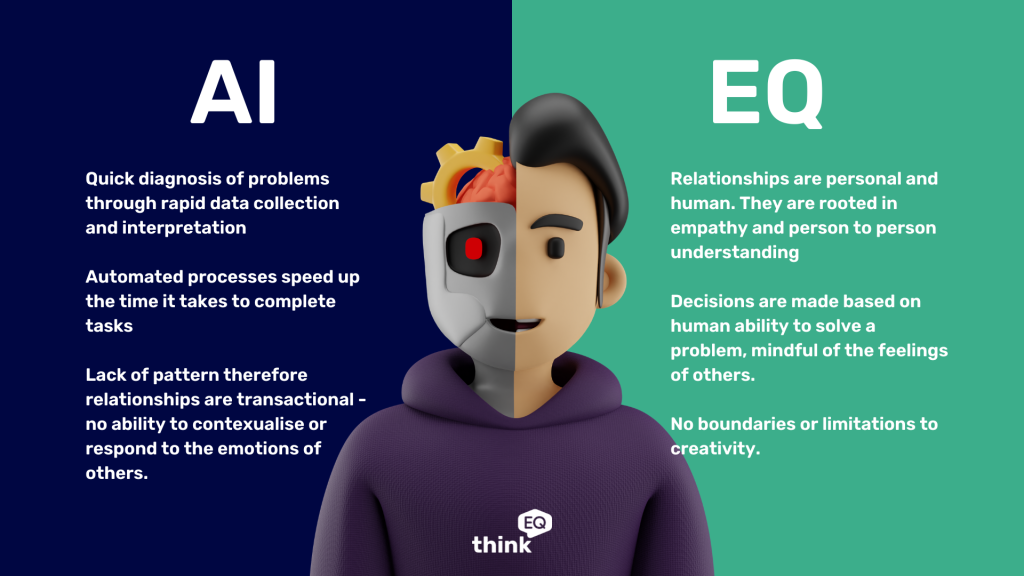Artificial intelligence (AI) has taken over the world of technology by storm. It’s transforming industries and changing the way we live our lives on a daily basis. But with all the benefits of AI, there is also a downside. As machines become smarter and more autonomous, there is a growing concern that they will replace human beings in many jobs and replace human connection in the workplace altogether. In this blog, we’re going to look at the human cost of artificial intelligence and why emotional intelligence isn’t just the antithesis but the antidote.
AI & EI – The Status Quo
A report from investment bank, Goldman Sachs, reports that Artificial intelligence (AI) could soon replace the equivalent of 300 million full-time jobs. The fields of journalism and law are cited as being among the most vulnerable occupations. If the objective with artificial intelligence is to replace writers with robots who can churn out articles faster than a toupee in a hurricane, then that’s got to be a good thing. But without solid skills in self-awareness, reality testing and decision making, essentially ‘Emotional Intelligence’, those articles could land the wrong way at the wrong time and do more harm than good.
“The law is reason free from passion”. It’s a quote from the rom-com, Legally Blonde, or more specifically, a movie reference to a quote made by Aristotle. Artificial Intelligence would relish this quote as it seeks to point out that the law is black and white, without context or interpretation. We know that’s not the case though and that’s why lawyers, too, need to have a rounded and well-developed Emotional Intelligence.
But is it not just the case that artificial intelligence is just the inevitable next step in the evolution of the workplace? Was it always destined to happen? The same research points out that 60% of workers now are working in jobs that didn’t exist in 1940. Had they known then about workplaces now, would this have created a sense of hope and excitement or one of fear and anxiety?
Emotional Intelligence Matters Now More Than Ever
There are some things Artificial Intelligence cannot replace and those are the capability to recognise, understand, and manage our own emotions, as well as the emotions of others. In other words, the ability to be empathetic and to connect with people on a personal level. This is something that AI simply can’t do. Machines may be able to process vast amounts of data and perform complex calculations, but they are not capable of showing compassion, understanding, or creativity.

The Risks Of AI Over EI
There is no doubt that Artificial Intelligence will revolutionise the way we live our lives for the better. Take ChatGPT as an example. It’s the most impressive, advanced, and intelligent chatbots arounds. It’s like the Google search engine, if Google search could write you a 1000-word essay on any subject at all in the space of around 10 seconds. But it answers in black and white without consideration, context or feeling.
One of the key areas where emotional intelligence is essential is in building relationships. Whether it’s personal or professional, relationships are built on a foundation of trust and understanding. Without emotional intelligence, it’s impossible to establish meaningful connections with people. This can lead to feelings of loneliness, isolation, and disconnection. Leading an organisation without emotional intelligence could be catastrophic and undo the years of work that has been done to optimise performance through the empowerment of people. People are all different. They aren’t stats or data or numbers.
A New Era Of AI And EI
As with the workers of the 1940s, will we become cognizant of the negative effects of AI to the extent that we become an even more human world as a result? Will AI and EI become intertwined to work as one? Who knows. Watch this space.
Want to know more about the emotional intelligence tool, the EQ-i 2.0 and how we work with individuals and organisations to optimise performance through people, click here.
Read our case study on how we worked with a leading engineering firm to compare emotional intelligence levels across their global offices to create a winning people strategy.
